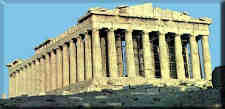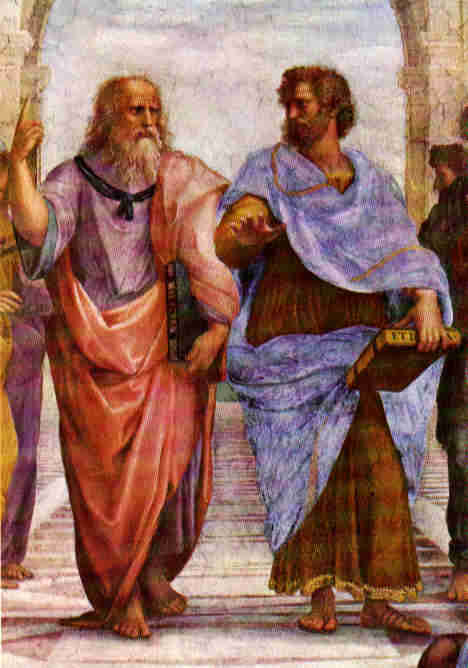|
The
Cradle of Western Civilization
 About
2,500 years ago, the people of Greece introduced many
valuable ideas and developed a civilization that
influences the way we live today. The ancient Greeks
attempted to explain the world through the laws of
nature. They developed democracy, where people govern
themselves instead of being ruled by a king. They made
important discoveries in science. The Greeks also valued
beauty and imagination. They wrote many stories and plays
that continue to be performed more than 2,000 years
later. About
2,500 years ago, the people of Greece introduced many
valuable ideas and developed a civilization that
influences the way we live today. The ancient Greeks
attempted to explain the world through the laws of
nature. They developed democracy, where people govern
themselves instead of being ruled by a king. They made
important discoveries in science. The Greeks also valued
beauty and imagination. They wrote many stories and plays
that continue to be performed more than 2,000 years
later.
Greece is a small,
rocky peninsula in southeastern Europe. The people of
ancient Greece could not farm most of their mountainous
land, so they turned to the sea. They became excellent sailors who traveled to
distant lands. The learned the alphabet from the
Phoenicians, a sea faring people from modern day Syria
and Lebanon.
the sea. They became excellent sailors who traveled to
distant lands. The learned the alphabet from the
Phoenicians, a sea faring people from modern day Syria
and Lebanon.
Today there is a modern
nation known as Greece, but ancient Greece was not a
nation. It was a group of city-states, or nations the
size of cities. A Greek city-state was known as a
polis, and a group of city-states were known as
poli. The Greek poli developed
independently of one another because they were isolated
by rugged mountains or were located on small islands. The
poli often developed alliances, called leagues,
for protection against other city-states and foreign
invaders. Two of the most important Greek poli were
Athens and Sparta.
Ancient
Greece developed an advanced civilization.
- The Greeks were excellent sailors who traveled to
distant lands.
- The idea of democracy developed, so more people were
involved in making decisions.
- The Greeks peninsula was less likely to be invaded
than other places. High mountains in the north and the
Mediterranean Sea in all other directions surround
Greece.
The
Greek poli were separate tiny nations, but they had many
things in common.
- The city states all spoke a common language.
- The city-states were small and often had to depend on
one another to survive.
- The city-states met every year in a great athletic
contest called the Olympics.
|
 About
2,500 years ago, the people of Greece introduced many
valuable ideas and developed a civilization that
influences the way we live today. The ancient Greeks
attempted to explain the world through the laws of
nature. They developed democracy, where people govern
themselves instead of being ruled by a king. They made
important discoveries in science. The Greeks also valued
beauty and imagination. They wrote many stories and plays
that continue to be performed more than 2,000 years
later.
About
2,500 years ago, the people of Greece introduced many
valuable ideas and developed a civilization that
influences the way we live today. The ancient Greeks
attempted to explain the world through the laws of
nature. They developed democracy, where people govern
themselves instead of being ruled by a king. They made
important discoveries in science. The Greeks also valued
beauty and imagination. They wrote many stories and plays
that continue to be performed more than 2,000 years
later.
 the sea. They became excellent sailors who traveled to
distant lands. The learned the alphabet from the
Phoenicians, a sea faring people from modern day Syria
and Lebanon.
the sea. They became excellent sailors who traveled to
distant lands. The learned the alphabet from the
Phoenicians, a sea faring people from modern day Syria
and Lebanon.